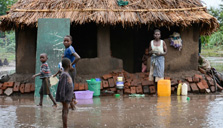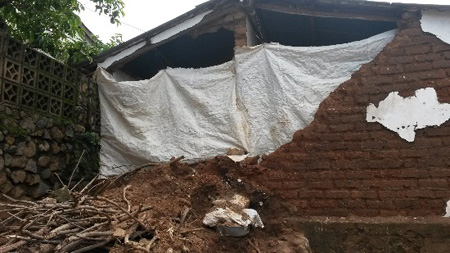Many people here daily live life on the edge, so it doesn’t take much to push it over into an emergency. As Malawi last week experienced its usual annual rainfall during just three days, we found ourselves experiencing a natural disaster. Early signs of the larger disaster came as three people came to our home in Blantyre over a twelve hour period to report that their houses had collapsed the previous night. A few days later I walked around a township five minutes from our house to get an idea of how people had been affected. Almost every other house in the area had lost at least one wall, most were patched up with plastic nailed into remaining bricks, with bottle tops against the plastic to try to stop it tearing.
More dramatic reports are coming from the Shire Valley, an hour to the south of Blantyre where much of the farming land is low lying, on the banks of the Shire River. 176 people have been reported dead, with many more missing, and an estimated 200,000 have lost their homes. Schools are unable to run as people are using them for shelter and dwindling food supplies (always short at this time of year) have been lost. Electricity and water supplies – already unreliable – have been severely disrupted following the flooding.
Acute-on-chronic emergency
As I guess is often the case during emergencies in marginal environments, the problems being experienced are ‘acute on chronic’. As people generously respond to the acute situation, regular services risk being neglected. We may respond and react in a crisis, but why can’t we plan to prevent one? Planning building more carefully, using fired bricks and moving away from flood plains would all help to prevent disaster.
Away from the flooding, there are different kinds of disaster. In Malawi’s biggest hospital, where I work as a palliative care doctor, oral morphine supplies ran out last week. It’s distressing that this is unlikely to get any attention or funding despite the fact that it is an ‘emergency’ for the many people suffering severe, chronic pain.
Reflecting on some of these questions has made me feel uncomfortable and at times disappointed as I recognise my own hard heart towards those in most need. I recognise the immense privilege and protection I have from many of the effects of the flooding: my home is intact, I have plenty of food and (intermittently) water in the taps. Over recent days God seems to be teaching me that we are all more prone to responding to crises than carefully planning preventative measures. When do we pray hardest, seek wisdom from the Bible and force ourselves to take difficult decisions? It’s much more likely to be when the heat is on: when our house is leaking, when our marriage is failing or some illness hits. We are all much the same, it’s just that for those living on the flood plains a small change in circumstances can mean life or death.
God sent his Son to ‘rescue’ or ‘save’ us. We are in a crisis, and our choices will mean eternal life or death. It would be good if we all planned in a timely way, but the truth is, we don’t. I guess that is really more important.
Practical response – how you can help
Our palliative care team at the hospital is trying to assist those who have been affected by flooding. We are assessing the needs of patients and families who are known to us as well as working with a local community based organisation. Money raised by the EMMS appeal will assist with this and with the response at Mulanje Mission Hospital which is also in a very badly affected area.
Gifts made before 31st January 2015 will be matched by the UK government, giving more children the care they need. Your gift to help them respond to this disaster will be matched by the UK government pound for pound.





